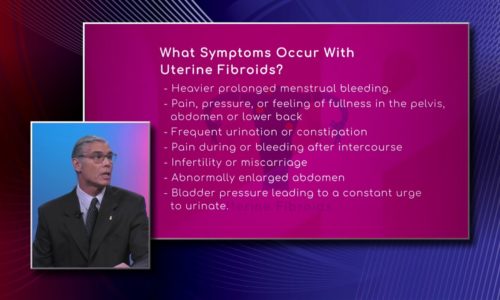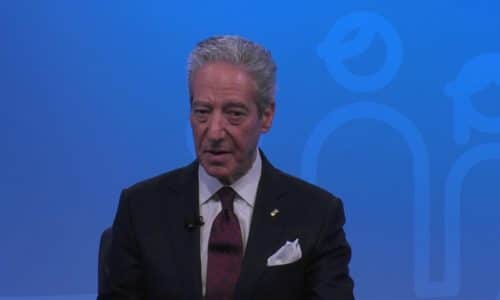Intimacy After Prostate Surgery |

In an episode of Doctor Q & A on the Health Channel, Dr. Michael Poch, a urologist at Moffitt Cancer Center, answers viewer-submitted questions about prostate cancer. One viewer, Beth, calls in and asks the doctor, “Is it possible to be intimate after prostate surgery?”
Dr. Poch assures her that yes, it is still possible to be intimate after prostate surgery. “There are two main side effects of surgery. The first is urinary incontinence, meaning that men are unable to hold in their urine, that’s something that usually gets better after surgery, but it can take weeks to months, and even up to a year to recover. The second side effect is that sexual function can be affected. The nerves that provide the ability for the penis to become erect sit on top of the prostate. So, when we do surgery sometimes, we need to remove the nerves with the prostate but sometimes we can leave those nerves. If you can leave the nerves intact and just remove the prostate by itself then you’re more likely to have a good outcome in terms of your sexual function,” Dr. Poch says. Unfortunately, if your prostate cancer is aggressive and those nerves need to be removed, your sexual function can be affected down the road.
The host of Doctor Q & A asks Dr. Poch, “Is the surgery robotic and how is sexual function then restored after?” Dr. Poch answers affirmatively. “Most of the surgery that is done in the United States for prostate cancer is done robotically these days. It is called robotic laparoscopic surgery. Anytime you enter the abdominal cavity, and you pump it full of gas to create space, it is called laparoscopy, similarly to how the appendix, gallbladder, and colon are removed these days. We attach a surgical robot to the ports, and we control the robot from a bedside console to do the operation. There are some centers where the operation is still done open, but increasingly, surgeons are moving over to the less invasive, robotic platform,” Dr. Poch explains. Recovery from robotic operations is easy. Most patients stay the night in the hospital and go home the next day. Usually, patients go home with a catheter in their bladder, but that catheter gets removed after about two weeks. Dr. Poch goes on to answer the second part of the question and explains that the recovery of sexual function after surgery is usually done with medication. Dr. Poch stresses that it may take time for sexual function to recover after surgery.
The Health Channel host asks Dr. Poch if men are likely to be communicative with their doctor and family about issues they are having after the surgery. Dr. Poch answers that while yes, communication is better today, everyone comes in with different circumstances. “I think one of the challenges that we’ve had during the past 18 months is there’s been certain restrictions on family members coming into visits. So having that discussion with all the appropriate family members has been hard. Setting expectations, going over side effects, risk factors, etc. has been exceedingly challenging, particularly around some of these sensitive topics,” Dr. Poch explains. “I think that the physician’s job in this scenario is to make people feel comfortable enough that they can open up and have a free discussion about some of those things.”
A viewer, Michael, writes to the Health Channel’s Doctor Q & A program and asks Dr. Poch, “Do certain spices like garlic or cannabis products help in the fight against prostate cancer?” Dr. Poch replies that unfortunately there are not a lot of studies that support some of the naturopathic remedies or medicines that people try. Dr. Poch adds, “I know actually at least for CBD oil there’s been some lab studies to suggest that it does have some anti-cancer effects.” Hopefully, over the next decade or so more studies will come out in support of naturopathic remedies so patients can take their health into their own hands and decrease their risk of cancer while also receiving standard care from a physician.
The host then asks Dr. Poch if there are any specific diets that have research showing that they reduce the risk of prostate cancer. Dr. Poch replies by saying that we know from some studies that if you have a diet that is low in animal fat and high in vegetables it decreases your risk of prostate cancer. “What I usually tell my patients is that the healthier you are, the healthier you will be. So, if you practice a healthier lifestyle, you’ll be better all-around in terms of your physical health,” Dr. Poch says.
Dr. Poch answers a final viewer question, who asks, “Is it a problem that my husband goes to the bathroom every night three to four times an evening?” Dr. Poch answers by saying it is a problem if her husband is annoyed by the fact that he is waking up. “That frequency of urination at nighttime, we call that nocturia. If you’re doing it three to four times a night, typically that’s impeding your sleep and so that’s probably something that should be evaluated,” Dr. Poch suggests. Typically, benign prostate growth, that occurs as men get older, begins to impede urinary flow. So, it either decreases your emptying or decreases the ability for the bladder to get all the urine out. There are some other reasons someone could have nocturia, especially that many times per night. It certainly should be evaluated by a urologist, especially if it is bothersome to the patient.
Watch the full segment of Dr. Michael Poch discussing Prostate Cancer, here: https://youtu.be/4SGy3KDxy8s. To learn more about prostate cancer research, visit the Prostate Cancer Foundation’s website at: pcf.org








